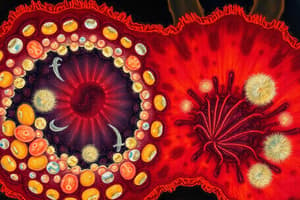Podcast
Questions and Answers
What is the discipline that explores the fundamental structures, functions, and interactions within cells?
What is the discipline that explores the fundamental structures, functions, and interactions within cells?
Cell biology
Name one specialized structure found in a cell.
Name one specialized structure found in a cell.
Mitochondria
What process creates new cells from existing ones?
What process creates new cells from existing ones?
Cell division
Which type of cell division results in genetically identical daughter cells?
Which type of cell division results in genetically identical daughter cells?
How do cells communicate with one another?
How do cells communicate with one another?
What do cell biologists explore in terms of cellular dynamics?
What do cell biologists explore in terms of cellular dynamics?
What are some practical applications of cell biology in industries?
What are some practical applications of cell biology in industries?
What are common educational paths for those interested in careers in cell biology?
What are common educational paths for those interested in careers in cell biology?
How can researchers and professionals stay current in the field of cell biology?
How can researchers and professionals stay current in the field of cell biology?
What drives the growth and evolution of the field of cell biology?
What drives the growth and evolution of the field of cell biology?
Flashcards are hidden until you start studying
Study Notes
Cell Biology: The Building Blocks of Life
Cell biology is a discipline that explores the fundamental structures, functions, and interactions within cells, offering insights into life at its most basic level. Comprising a wide array of specialized fields, cell biology investigates topics such as cell structure, communication, and division.
Cell Components and Interactions
The cell, the smallest functional unit of life, consists of various specialized structures, including the membrane, nucleus, mitochondria, endoplasmic reticulum, and ribosomes, among others. Cell biologists study how these components interact, ensuring the cell's homeostasis and carrying out its vital functions.
Cell Division: Mitosis and Meiosis
Cell division, a process that creates new cells from existing ones, occurs through two main types: mitosis and meiosis. Mitosis results in two genetically identical daughter cells, while meiosis leads to gametes, or sex cells, with one-half the genetic material of the parent cells.
Cell Communication and Signaling
Cells do not function in isolation but instead communicate with one another through chemical and physical signals. Cell biologists study how these signals, such as hormones, neurotransmitters, and growth factors, are received, processed, and transmitted, allowing cells to interact within tissues and organs.
Cell Dynamics: Movement and Transport
Cells are constantly in motion, with structures and components migrating and moving within the cell. Cell biologists explore this cellular dynamics, examining how substances and organelles are transported within cells and how cells themselves move and change position in response to internal and external cues.
Cell Biology's Impact on Industry and Research
Cell biology's practical applications span a wide range of industries, from pharmaceuticals to biotechnology. Researchers and professionals in cell biology are involved in developing new medical treatments, conducting drug discovery, and designing innovative diagnostics.
Employment opportunities in cell biology span various roles, from research assistants to senior scientists. The field is continually evolving, with new techniques and technologies—such as live-cell imaging, CRISPR gene editing, and high-throughput screening—driving its growth and shaping the careers of its practitioners.
Education in Cell Biology
Those interested in pursuing careers in cell biology will often begin their studies with a bachelor's degree in biology, chemistry, or a relevant field. Postgraduate qualifications, including master's and doctoral degrees, are also common paths to specialization and career advancement.
Staying Current in Cell Biology
To keep up with the rapid pace of discovery and innovation in the field, researchers and professionals are encouraged to read extensively, attend conferences, and collaborate with peers. Often, this will involve a combination of staying current with the primary scientific literature and engaging with the broader scientific community through professional organizations and networks.
In summary, cell biology is a versatile and dynamic field that offers a wealth of opportunity for exploration and discovery. Whether investigating the fundamental mechanisms of life or creating innovative solutions to complex biological problems, cell biology is a field shaped by the curiosity of its researchers and the potential of its applications.
Studying That Suits You
Use AI to generate personalized quizzes and flashcards to suit your learning preferences.




